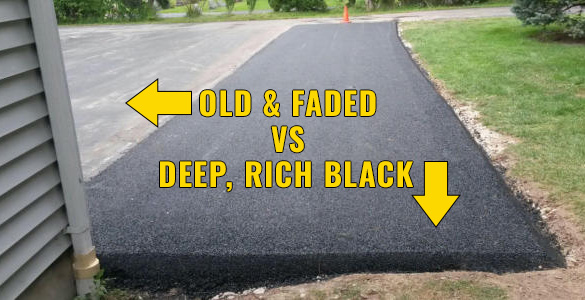Take Full Advantage Of Safety And Security with Angle Parking Areas: Superior Asphalt Sealing
Take Full Advantage Of Safety And Security with Angle Parking Areas: Superior Asphalt Sealing
Blog Article
Cold Mix Asphalt Vs. Hot Mix Asphalt: Which Is Right for You?

Composition Distinctions
Cold mix and hot mix asphalts vary dramatically in their structure, with unique qualities that influence their efficiency and applications. Cold mix asphalt is produced by emulsifying the asphalt binder with water and an emulsifying agent prior to mixing it with accumulation. This method enables the asphalt to be workable at reduced temperatures, making it suitable for short-lived repair services and for usage in cooler weather. Hot mix asphalt, on the various other hand, is made at heats, usually between 300-350 ° F, which assists to accomplish far better compaction and a much more durable end product. The warm mix asphalt production process entails warming the accumulation and asphalt binder separately prior to combining them at the asphalt plant.
Furthermore, chilly mix asphalt has a tendency to be less dense and much more versatile than warm mix asphalt. This adaptability makes it far better fit for locations with greater degrees of movement, such as driveways or roadways with hefty website traffic. In contrast, hot mix asphalt is known for its high toughness and resistance to rutting and cracking, making it a preferred choice for freeways and high-traffic roadways where durability is critical.
Installment Refine Variations
The process of setting up cold mix and warm mix asphalt displays remarkable differences in their procedures and requirements. In comparison, hot mix asphalt requires an extra elaborate setup process. Due to the heating demands, warm mix asphalt installments are usually carried out by experts with customized tools, guaranteeing an extra long-term and structurally audio outcome.
Resilience and Long Life Factors
When thinking about asphalt choices, resilience and durability are important elements to evaluate for long-term sidewalk performance. Hot mix asphalt (HMA) is recognized for its outstanding sturdiness and longevity.
In regards to durability, HMA typically surpasses CMA because of its superior toughness and resistance buildings. HMA pavements have a longer life span, needing less regular repair work and upkeep, which can translate to set you back savings over time. Additionally, HMA sidewalks are extra quickly adjustable to meet certain project needs, even more boosting their resilience.
Price Factors To Consider
Taking into consideration the economic ramifications is an essential aspect when assessing the choice in between hot mix asphalt (HMA) and cool mix asphalt (CMA) for sidewalk projects. While the preliminary expense of hot mix asphalt is typically higher than that of chilly mix asphalt, HMA frequently offers an extra affordable option in the lengthy run due to its superior durability and long life. HMA is recognized for its ability to endure rush hour loads and severe weather condition conditions, reducing the need for regular repair services and upkeep. On the other hand, cold mix asphalt is a lot more budget friendly upfront but may need even more regular patching and resurfacing, causing greater maintenance expenses in time.
Along with material costs, it's necessary to take into consideration the expenditures linked with setup and maintenance when contrasting HMA and CMA. HMA usually calls for specific equipment and skilled labor for appropriate setup, which can impact total job costs. On the other hand, CMA is much easier to collaborate with and can often be used utilizing easier methods, potentially lowering setup expenses. Inevitably, the decision in site link between HMA and CMA must take into account not simply the preliminary cost yet also the lasting monetary implications to establish the most cost-effective alternative for the details sidewalk project.
Environmental Effect Contrast
Comparison of the environmental impacts between hot mix asphalt (HMA) and cold mix asphalt (CMA) discloses distinctive distinctions in sustainability techniques. HMA manufacturing needs high temperatures, leading to try these out enhanced energy consumption and greenhouse gas emissions.
Furthermore, making use of CMA frequently involves reusing existing asphalt sidewalk, advertising resource preservation and decreasing the amount of waste sent to landfills. This recycling aspect further enhances the sustainability of CMA contrasted to HMA. On the whole, when taking into consideration the ecological effect, CMA becomes an extra eco lasting selection due to its reduced power needs, minimized emissions, and the potential for reusing existing materials. By opting for CMA over HMA, roadway building and construction jobs can contribute favorably to ecological conservation initiatives.
Verdict
In final thought, the choice between cool mix asphalt (CMA) and hot mix asphalt (HMA) depends upon numerous variables such as structure, installment procedure, longevity, longevity, price, and ecological impact. asphalt repair. While CMA uses a economical and quick solution for minor repair services, HMA ensures exceptional longevity and long life for rush hour areas. Take into consideration these variables thoroughly to identify which kind of asphalt is the best option for your paving needs

Taking into consideration the economic effects is an essential aspect when evaluating the choice between warm mix asphalt (HMA) and chilly mix asphalt (CMA) for pavement jobs. While the first price of warm mix asphalt is commonly greater than that of cool mix asphalt, HMA typically offers an extra economical option in the lengthy run due to its superior longevity and long life. asphalt patch repair.Comparison of the ecological effects between warm mix asphalt (HMA) and cool mix asphalt (CMA) discloses unique distinctions in sustainability techniques.In final thought, the choice between cold mix asphalt (CMA) and hot mix asphalt (HMA) depends on different variables such as structure, setup procedure, page sturdiness, long life, cost, and environmental effect
Report this page